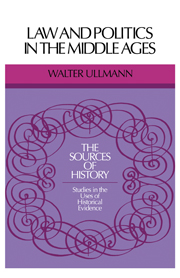Book contents
- Frontmatter
- Contents
- Dedication
- General Editor's Introduction
- Preface
- Abbreviations
- 1 Introduction
- 2 The Roman Law
- 3 The Scholarship of Roman Law
- 4 The Canon Law
- 5 The Scholarship of Canon Law
- 6 Non-Roman Secular Law
- 7 Governmental Doctrines in Literary Sources
- 8 The New Science of Politics
- Select Bibliography
- Index
3 - The Scholarship of Roman Law
Published online by Cambridge University Press: 13 November 2009
- Frontmatter
- Contents
- Dedication
- General Editor's Introduction
- Preface
- Abbreviations
- 1 Introduction
- 2 The Roman Law
- 3 The Scholarship of Roman Law
- 4 The Canon Law
- 5 The Scholarship of Canon Law
- 6 Non-Roman Secular Law
- 7 Governmental Doctrines in Literary Sources
- 8 The New Science of Politics
- Select Bibliography
- Index
Summary
The growth of the archetypical University of Bologna was directly related to the profound social, religious and intellectual upheaval which the Investiture Contest occasioned. This university—the citadel of all legal studies throughout the medieval period—was in its beginnings and for the first decades of its existence a lay and purely private academy consisting of laymen who taught laymen the science of law. The one and only subject which formed the topic of academic instruction—down to 1365 when theology was added—was Roman (and a little later canon) law: the Roman law was now available in its totality, that is the Digest, the Code, the Institutes, and the Novellae. It is impossible to exaggerate the significance of the emergence of this seat of learning—and of its academic satellites—and of the kind of advanced education it provided, for the intellectual complexion of Europe for several generations. The growth of this institution was spontaneous and conditioned by the gruelling conflict that affected the very foundations of contemporary society and of its government. From the social as well as intellectual standpoint, Bologna and its offsprings may well be considered powerhouses of the central medieval period. They assumed a parental function in regard to medieval (and to a very considerable extent also modern) Europe especially when from about 1140 onwards canonistic jurisprudence came to be established next to its civilian counterpart. The universities, notably their law faculties, were so to speak living sources of contemporary governmental developments. The very fact that the universities and law faculties soon proliferated throughout Western Europe reflected the needs of contemporary society for the scholarly pursuit of jurisprudence (which included the science of government) no less than the need for a personnel that was properly trained in the matters which fell into the orbit of government.
- Type
- Chapter
- Information
- Law and Politics in Middle Ages , pp. 81 - 116Publisher: Cambridge University PressPrint publication year: 1976



